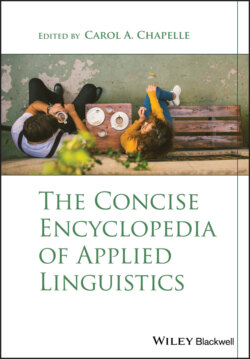Читать книгу The Concise Encyclopedia of Applied Linguistics - Carol A. Chapelle - Страница 136
Vocabulary Knowledge
ОглавлениеKnowledge of word meanings and the ability to retrieve them through word form analysis contribute directly and reciprocally to all other operations in reading. As an illustration, word meaning retrieval depends on accurate and speedy word form analysis (orthography, phonology, and morphology) for identifying the word whose meaning is to be retrieved. It also relies on local text meanings for selecting the context‐appropriate sense from a set of meanings conveyed by the word. Conversely, vocabulary knowledge serves as a joint that connects the graphic form of a word with what the reader knows about the referent of the object the word represents. The connection is important because stored knowledge of word forms has an arbitrary relation to representations of real‐life experiences in memory (Schreuder & Flores d'Arcais, 1992). Knowledge of word meanings in a way functions as a passcode to one's knowledge bases because they include “information about the things to which words refer—be they related to the external world or internal states of the mind” (p. 422).
As a complex construct, vocabulary knowledge emerges gradually through repeated encounters with a word referring to a particular object, event, or property in particular situations. Because words convey different meanings in different contexts, word meaning retrieval must include the selection of the sense that best fits the context in which the word appears. Anderson and Nagy (1991) underscore the importance of flexibility in meaning sense selection during text comprehension. They contend that “really knowing a word… always means being able to apply it flexibly but accurately in a range of new contexts and situations” (p. 721).
In recent years, academic vocabulary has attracted considerable attention. The central concern of this research is how instruction can foster the genre‐specific vocabulary knowledge. Using the metaphor of “words as tools,” Nagy and Townsend (2012) argue that knowing words implies the ability to use the knowledge as tools for communicating and thinking about disciplinary contents. Because academic language competence differs across disciplines, it is essential that vocabulary instruction take into account the genre‐specific purposes for which words are used, so as to provide the learner with opportunities to use academic words for those discipline‐specific purposes.
